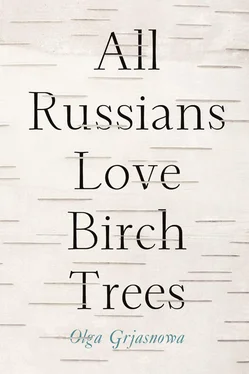“I’m not hungry,” I answered.
“Then why’d you go out to eat?”
I paid, not leaving a tip, and went out to the street. Again and again, I checked my cellphone — no messages. I circled the taxi stand a couple of times. The drivers waited with motors running.
Riding through Tel Aviv in the back of a cab, loud mizrahi music blasting from the radio, the driver steering with one hand and tapping the beat with the other, I felt at home. It was a home long forgotten, a mosaic of landscape, temperature, music, smells, and the sea. I asked the driver to go along the beach and through the poorer southern Tel Aviv. That’s when it occurred to me that the feeling of home was associated with places that reminded me of Baku.
The lock at the front door made suspicious noises. I was sure I’d been robbed. I unlocked the door and yelled, “Hello.” To scare the burglars, I guess. It smelled funny, but the apartment was empty. On the kitchen table I discovered a limp bouquet and a note in Tal’s handwriting: “Take care of the cats. Please.” I found the cats in a carrier in my bedroom, their eyes glowing, hostile meows directed at me. A horrid smell was coming from the carrier.
“I need you,” Tal said a week later. She sat huddled at my kitchen table, crying. Again and again, she sobbed loudly. Tal’s eyes were bloodshot, her posture hunched, and her hair cut down to an inch.
“Where are my cats?” she asked as the crying ebbed away.
“In a shelter.”
“You gave my cats away?”
“I didn’t know if you’d come back.”
“How can you be so cold?”
“You just ran away. Honestly I didn’t think I’d ever see you again. Tal, what is it that you want?”
“Your help.”
“You don’t really mean that, do you?”
“We need a translator. Masha, you can’t imagine what’s going on there.”
I didn’t reply, because at that moment I understood that Tal wouldn’t leave me. She would always be coming back, until she had sucked me dry completely. But there wasn’t much left in me anyway.
“Just this one last time. Promise. If you still have feelings for me, then come with me.” Tal placed her palms on my cheeks.
The summer air was hot and humid, like every day. By the time I made it down the five sets of stairs from my apartment to the street, I was soaked in sweat. In the supermarket, tourists were frantically looking for someone to translate the Hebrew product information. Others skeptically inspected the kashrut confirmation on the packaging. I bought coffee and milk, then crossed the street toward the fast-food restaurants.
The Indian food sat in two small boxes. Elias wasn’t hungry. He lay on the couch apathetically, covered by a light blanket, flipping through channels. I sat down next to him and snuggled up. I wanted to feel his warmth, kiss him and stroke him, but he didn’t move, wouldn’t grant me even the slightest tenderness. Rigor mortis had already set in.
None of the incoming cars was stopped at the checkpoint. All the energy went into inspecting the cars that went the other way, into Israel. Tal’s thin hands clasped the steering wheel, white knuckles protruding. I hadn’t asked where we were going, didn’t want to know. In the back were three boys, all vegans, squirming nervously in their seats.
“Do you have your passport?” Tal asked and shot me an irritated glance. She wore a prim dress that covered her shoulders and knees. It was the color of an Afghan burka. We passed the checkpoint and then a construction site, where an entire block of luxury condos was being erected.
“What would happen if I was to discover in Ramallah that I didn’t have my passport on me? Do you think they wouldn’t let me back into Israel?”
“This is not your average Sunday outing,” Tal said.
“Looks like Sunday to me.”
We didn’t speak for the rest of the way.
Tal left the car in the city center, right next to the grave of a late Fatah fighter. The grave was decorated with flowers, like a roadside memorial for someone who had died in a car accident. Above the grave was a huge billboard displaying a picture of the deceased, a lanky man in a wool pullover holding a machine gun. The barrel of the gun was pointed directly at his own grave. As if we were shooting himself until eternity. On the side of the road were expensive SUVs with stickers bearing the logos of international aid organizations.
The vegans were standing next to the car, a little uncertain. I speculated that they were embarrassed to be overheard speaking Hebrew — which would have been somewhat inappropriate in the middle of Ramallah — but nobody wanted to be the first to break into English. None of them spoke Arabic, which was why they now stuck to their embarrassed silence. I could’ve done them the favor of saying something and thereby establishing English as the language of choice, but I didn’t.
Tal went ahead. Her steps were long and energetic — we had trouble keeping up. It was a rainy Friday morning and the city center was deserted. I assumed that most men were at the mosque and women at home. I counted the doorbell signs of international NGOs, UN schools, and parking lots supported by the European Union. A parade of the new colonialism.
Tal took to it like a duck to water. No sign of her nervousness.
“Here.” Tal pointed at a house.
I said hello into the intercom, the heavy iron gate opened, and a petite woman approached us. Her face was powdery and her eyes black-rimmed.
Salam had a firm handshake and the habit of looking whomever she was talking to directly in the eyes. She told us to take a seat in her living room and disappeared into the kitchen.
The curtains were closed and the floor was covered in soft wool rugs. It was a large room and as far as I could discern in the dim light, reproductions of French impressionists and large oil paintings hung on the wall. Judging by the quality of the latter, they might have been painted by one of the inhabitants. A Marianne, gripping a Palestinian flag, with chastely covered, if remarkably large, breasts. A crying child with blood smeared on its head, and an old, bent man in a loamy, dark prison cell, eyes cast longingly at a small window above. The painter had gotten the perspective wrong, but at least now the window looked out straight onto the dome of the rock. Every last remaining bit of free wall space was taken up by bookshelves.
On the table in front of us was a bowl of fruit — peaches, nectarines, and mangos. Other bowls held pieces of watermelon, dried fruits, and nuts. Salam came back with fresh juice, Turkish coffee, and sweet pastries. I complimented her on the pastries. She complimented me on my Arabic and asked about my Lebanese dialect.
Tal absentmindedly drew circles on the tablecloth. I said that I’d learned Arabic from my fiancé, who had been born in Beirut. I wasn’t quite sure why I lied to her, but it felt good to talk about Sami. Salam switched to English and that brought the small talk to a close.
Before getting down to business, everyone told their story, probably a pedagogical technique. Tal sat at the end of the sofa and slowly tore a paper napkin into pieces. Every muscle in her body was tense. When it was her turn all she said was: “Tal. We’ve been in touch.”
Salam nodded at her briefly and said, “I’m from a traumatized family. My father is a member of the Palestine Communist Party and has spent ten years in Israeli prisons. I always dreamed of becoming a doctor. After graduating, I got a scholarship to go to Prague, to study genetics.”
Salam took a break and topped off everyone’s coffee. Then she looked at me strangely and asked, “Are you OK?”
Читать дальше












